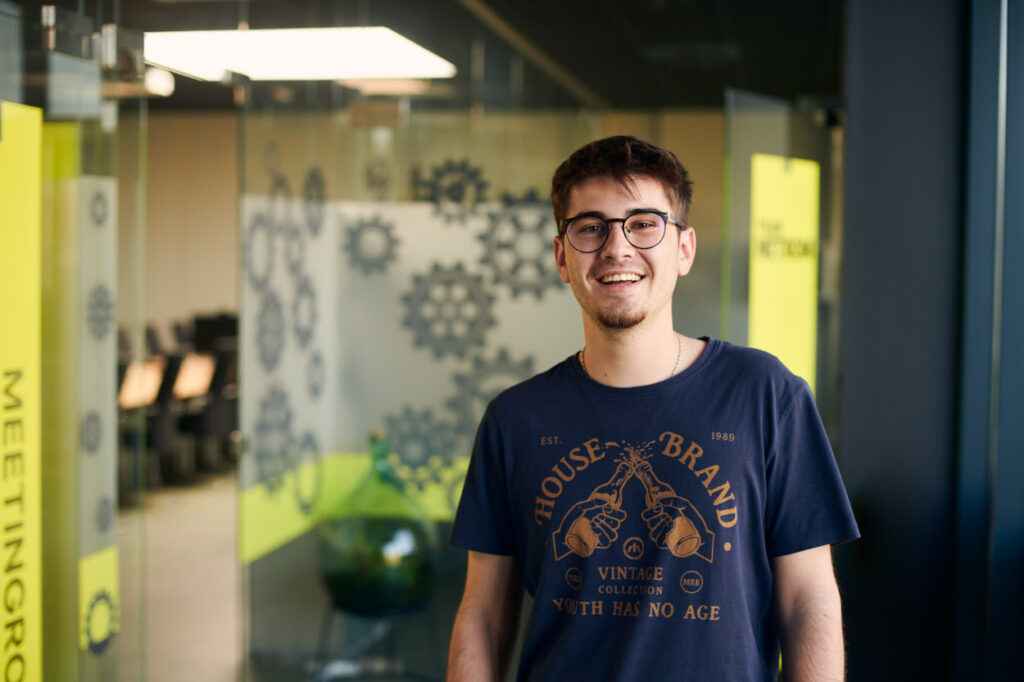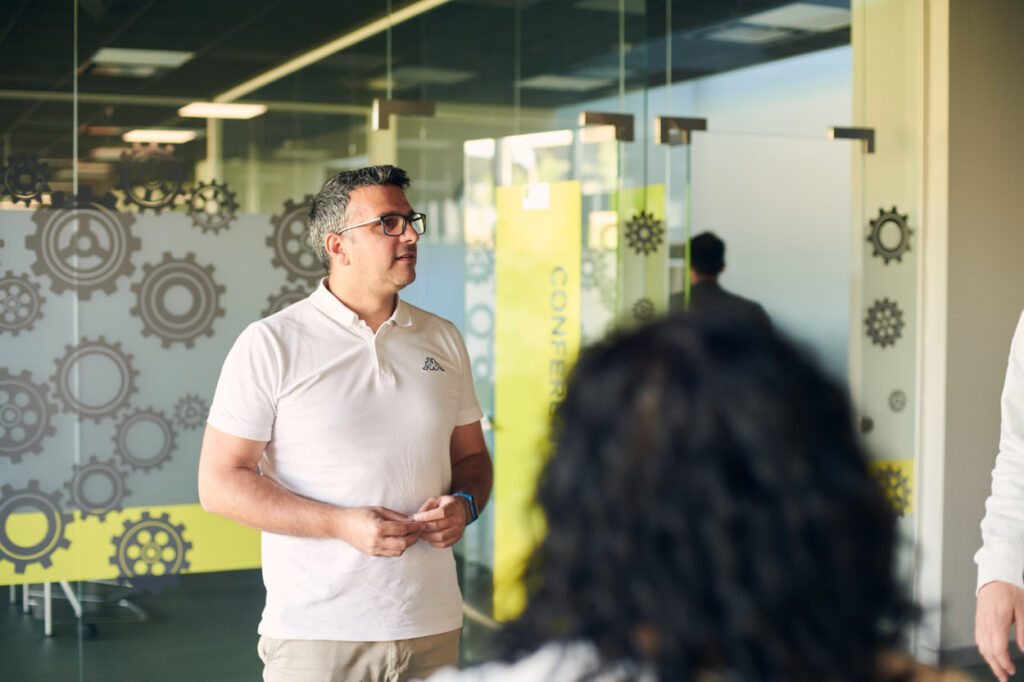
A digital transformation requires the right IT expertise. However, organizations do not always have the specialists needed to successfully complete such initiatives. As a result, they often turn to an IT service provider that assembles a development team to carry out the project. The composition of such teams is typically based solely on CVs. This approach has clear limitations. The following article explains why this method falls short and how NetRom applies a different approach.
A CV provides an overview of education, work experience, and technical skills, but it does not offer insight into an individual’s personality, collaboration skills, problem-solving abilities, or their compatibility within a team. These factors, however, are critical to the effectiveness of a development team responsible for software engineering.
A development team is more than a collection of individuals
Consider a team composed of individually outstanding developers, each with an impressive CV. But what happens if their personalities clash? What if they struggle to communicate effectively or have fundamentally different ways of working? In such a scenario, the combined output may fall far short of what the CVs suggest. Projects may suffer, deadlines may be missed, and the quality of the delivered software may be compromised.
In addition, selecting team members solely on the basis of CVs does not account for team dynamics. An effective development team is more than a group of individuals; it is a cohesive unit working toward a shared objective. The interaction between team members, their ability to complement one another, and their collective intelligence are just as important – if not more so – than individual competencies.

The NetRom approach: placing the engineer at the center
Since its founding, NetRom Software has observed that selecting team members solely on the basis of CVs does not lead to successful development teams in practice. A CV may highlight an individual’s technical skills, but it provides little insight into how that person functions within a team or contributes to the project’s objectives.
For this reason, when assembling a development team for a client project, we apply a holistic approach guided by five essential questions:
Does this personality fit the specific team?
We carefully analyze character traits, communication styles, and how individuals perform under different circumstances.
For example, a talented introverted developer may excel in a team that requires in-depth analysis and focused work, while an extroverted, communicative developer may be better suited to a role involving frequent client interaction and stakeholder management. The goal is to place the right person in the right position.
Where does this individual’s true added value lie?
Every developer has unique strengths that go beyond programming skills. Some excel at supporting and mentoring junior colleagues, others are natural problem-solvers, adept at debugging complex systems. Still others have a particular talent for understanding and translating business processes into clear technical specifications.
By recognizing and valuing these individual qualities, we build teams that not only complement each other technically but also enhance one another in terms of soft skills and work methods. This results in teams that outperform themselves and deliver the best possible outcomes.
How do we optimize team dynamics?
Team composition is an art that requires balancing personalities, expertise, and work styles. We aim to create teams that are both cohesive and resilient, teams capable of handling challenges and adapting to changing project requirements and circumstances.
We also examine past collaborations: have team members worked together before, and how did that experience unfold? We seek combinations in which team members naturally complement, challenge, and motivate one another to achieve their best performance. A well-balanced team fosters an environment in which everyone can grow and excel.
What tech stack does a developer have experience with?
For our diverse group of clients, we execute dozens of projects each year, each with specific technological requirements. NetRom provides full-stack expertise across a wide range of programming languages, including .NET, Java, PHP, Python, Ruby, and many other modern technologies.
Our developers typically specialize in one or more programming languages, frameworks, and architectures. They maintain and expand this expertise through courses, training programs, and continuous learning. For each project, we analyze which technologies are best suited and select developers with the most relevant and in-depth expertise for that specific area.
This technical matching ensures that projects are not only successfully delivered but also allows developers to work with technologies in which they excel and continue to grow professionally.
What domain knowledge does a developer have?
Working with developers who have experience in specific industries provides significant advantages for clients. Over more than 25 years, we have learned that the success of software development is determined not only by technical excellence but, above all, by a deep understanding of the industry in which the client operates.
Our IT specialists have developed extensive knowledge of industry-specific challenges, processes, and applicable laws and regulations. This domain expertise enables them to develop solutions that are not only technically sound but also commercially relevant.
For each software project, we deliberately select IT specialists with proven experience in the relevant industry. This approach results in software solutions that better meet the actual needs of end users and deliver value to the client organization more quickly.

The right people make the difference
In today’s market, technical skills are increasingly taken for granted. What distinguishes average results from outstanding outcomes? The people behind the code. Their approach to communication, problem-solving, and collaboration ultimately determines the success of your software project.
Each project requires specific personalities
Every project has its own character and therefore demands a tailored team composition. For projects with a start-up where innovation is central, we need developers who can handle uncertainty. These individuals enjoy experimenting, can pivot quickly, and are willing to take calculated risks. They thrive in environments where creativity takes precedence over strict protocol.
Enterprise projects with existing, complex systems, on the other hand, benefit more from developers who work methodically. These professionals have the patience for detailed tasks, value thorough documentation, and understand that quality control takes time but is an essential part of the development process.
Assembling a winning team
A strong development team is like a successful football squad: each player has a unique role that strengthens the whole. This diversity does not arise by chance but is the result of deliberate choices.
Leadership and execution in harmony
Every team requires both natural leaders, who can provide direction and make decisions under pressure, and dedicated executors, who turn plans into tangible results. It is not a matter of hierarchy, but of roles that complement one another.
Communication that works
A balanced mix of introverted and extroverted team members ensures effective communication. Extroverted colleagues lead brainstorming sessions, maintain client contact, and bring energy to the team. Introverted team members provide in-depth analysis, thoughtful reflection, and often the most creative solutions.

Specialists who make a difference
Within every team, specific expertise and roles are indispensable: the problem-solver who can identify complex bugs, the architect who sees the big picture, the quality specialist who notices the details, the communicator who can explain technical matters clearly to all stakeholders, and the analyst who can quickly diagnose issues. All of these different personality types contribute significantly to the successful execution of a software project.
Measurable results of the right team composition
This approach delivers concrete and measurable benefits for organizations. Teams that are deliberately composed based on complementary personalities experience significantly fewer communication problems and conflicts. Team members are more satisfied because their unique contributions are valued.
The results speak for themselves: higher productivity through improved collaboration, higher-quality code from diverse IT specialists, and cross-pollination between different personalities. Moreover, client satisfaction increases, as such a varied development team is better equipped to translate the unique needs of end users into concrete solutions.
NetRom Campus as a foundation for top performance
The well-being of our IT specialists forms the foundation of our corporate philosophy: “Employee First = Client First.” At NetRom, we recognize that top performance is only possible when our employees feel valued and supported.
This philosophy is not an optional HR slogan but a deliberate strategic choice with a direct impact on the quality of our software projects. Our investment in employees is ultimately an investment in the quality of the software we develop for your organization.
Through our NetRom Campus in Craiova, Romania, we continuously invest in facilities that support employee well-being. The campus provides over 500 professional workstations, complemented by sports facilities, a car wash, and a high-quality company restaurant where employees can eat for free.
Sharing meals in our own restaurant does more than provide proper nutrition, it strengthens interpersonal bonds and allows colleagues to get to know each other in an informal setting. These personal connections translate directly into better communication during projects and a deeper understanding of each other’s expertise.

Physical collaboration as a competitive advantage
By having our developers work together physically on our own campus, a team dynamic emerges that is difficult to replicate digitally. Direct communication, spontaneous brainstorming sessions, and the ability to solve complex problems collaboratively result in better code and faster delivery times.
This shared presence also naturally facilitates knowledge transfer: junior developers learn more quickly from experienced colleagues, while existing expertise is shared across teams. It fosters strong team cohesion, which has a positive impact on the quality of every software project.
Continuous development and growth
Continuous development is central to our philosophy. We make significant investments in training, courses, and workshops that enable our developers to continually enhance their technical skills. At the same time, we place strong emphasis on personal growth and the development of soft skills such as communication, collaboration, and leadership.
This approach results in a remarkably low staff turnover, which provides our clients with stable teams, long-term relationships, and consistently high-quality service delivery.
From well-being to measurable results
Our focus on employee well-being creates a constructive work environment in which people who feel valued are not only more productive but also more engaged in the success of projects. In carrying out their roles, they go beyond the technical requirements and actively contribute to solutions that truly add value.
The results are evident in our projects: motivated teams that bring out the best in themselves, proactively solve problems before they escalate, and have the ambition to not only meet but exceed expectations.
Teams-as-a-Service
At NetRom, we provide development teams in which the members collectively deliver more than the sum of their individual contributions. This is because the team works effectively together, with each member contributing their unique strengths to achieve strong overall results. NetRom calls this approach Teams-as-a-Service.
With our Teams-as-a-Service concept, we handle all aspects of team formation and management for our clients. The client does not need to worry about selecting the right team members, facilitating their development, or managing team dynamics. NetRom assumes full responsibility for leading a team that is fully customized for the client’s project.
Core aspects of Teams-as-a-Service
- End-to-End (shared) responsibility: Throughout the entire software lifecycle, our team works alongside the client to take joint responsibility for all processes, including analysis, design, development, testing, implementation, and maintenance.
- Output-focused: Rather than billing by the hour, the emphasis is on tangible output, such as functional features, prototypes, or complete applications that meet the defined requirements. This approach promotes efficiency and results-oriented delivery.
- Collaboration and synergy: The partner assembles a team in which individual members complement and strengthen each other based on their specific expertise, personalities, and experience. This leads to higher productivity and improved quality of the delivered software.
- Proactive approach: Our carefully selected team actively engages with your organization, identifies opportunities and risks, and proposes improvements, rather than simply following instructions. This transforms the team into a strategic partner rather than merely an execution unit.
In practice, our approach delivers. Clients value our Teams-as-a-Service model because it leads to better performance, more efficient processes, and high-quality software products. Additionally, our approach reduces stress for the client, allowing them to focus fully on their core activities and strategic objectives.

Choose strategic value
For our clients, outsourcing a project to NetRom means partnering with an organization composed exclusively of driven and motivated IT professionals. Our broad, versatile pool of more than 500 highly skilled developers enables us to quickly and effectively assemble teams that perfectly align with your requirements and objectives.
With Teams-as-a-Service, NetRom offers a distinctive approach in which human factors are considered just as important as technical competencies. By investing in people, wellbeing, and innovation, we ensure that our development teams consistently excel and make your software projects successful.
If you are seeking a development partner who looks beyond a CV and fully leverages the potential of the human factor in software development, NetRom is the right choice. Discover the power of the people behind the code and take the next step in software development. Contact us to learn how our Teams-as-a-Service model can digitally transform your organization.